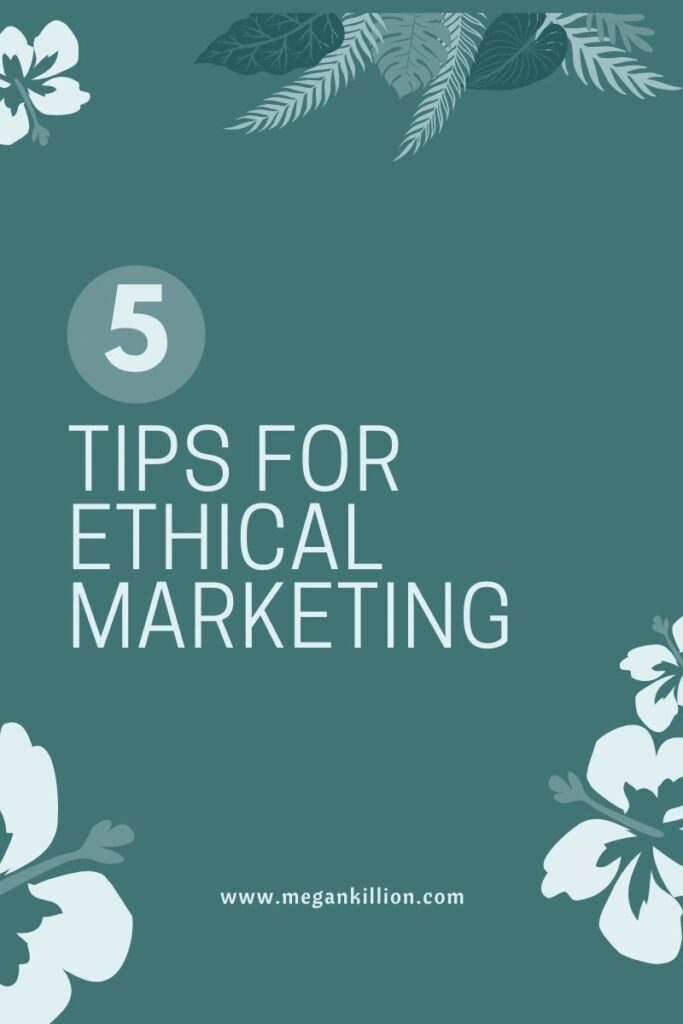Would you rather listen to this blog? Hosted on BuzzSprout
According to leaders in the field, marketing can either be ethical or unethical. There are many ways to market ethically, but these five tips can be a good starting point.
1) Think about the impact of your marketing.
2) Offer something of value to the consumer.
3) Make sure you know who your audience is and address them personally.
4) Avoid sneaky tactics and come across as genuine.
5) Use this blog as a guide on how to create an ethical marketing plan.
1) Consider your target audience
Understanding your target audience is vital in marketing. If you’re marketing something to someone who does not want it or trying to push prospects into something they won’t value, your chances of success are meager. You need to consider who your target audience is and provide them with content or offers that they will find engaging.
One way of finding out who your target audience is would be by putting up surveys and polls to see what people prefer.
At Megan Killion Consulting, understanding the target audience is all about DLOs (Director Level Objectives) as a B2B technology marketer, my clients are typically tech DMs. I need to understand where they “live” (the places they hang out online), their priorities, motivators, headaches, job responsibilities, threats they perceive to their job security, etc. Without a deep understanding of each buyer persona, my marketing is going to miss its mark. That’s why my intakes are intensive. I need to understand not only your product but your audience.
2) Don’t make promises you can’t keep
- Don’t make false claims about your products.
- Try to keep your ads appropriate and tasteful.
- Be honest in your advertising.
- Make sure that any offers you make are available to all customers.
- If you make a promise to customers or instruct your marketer to do so, you need to figure out a way to keep it.
- Whether you’re a sales & marketing first or a technology & development first company, the buyer and customer need to have a consistent, joyous journey. Be prepared to deliver.
3) Be genuine
Being genuine in your marketing is essential because people can see through insincerity. For example, if you have two social media profiles and one has an overtly promotional tone while the other tries to be entertaining, it’s clear which one is more credible. Be truthful in what you post, not just with your content but also with your privacy settings.
Your brand is more often than not about people. Encourage your people to be genuine, authentic, and honest (insert other synonyms here) in their work. At Megan Killion Consulting, we believe in radical transparency. Thus far, it’s served us well! Eventually, people will learn the truth. If you start with honesty and are transparent throughout the process, there are no surprises. This decreases churn, improves reputation, and helps me sleep soundly at night.
4) Don’t use deceiving messaging, hashtags, or sneaky tricks
Including hashtags in posts and tweets can have unintended consequences if done incorrectly. For example, people may see tweets with your desired hashtag but might not know what it refers to or how to get more information. They may also go into search engines looking for that hashtag and find something completely unrelated. Similarly, brands should not deceive readers by leading them to believe they are one thing when they are another.
Your messaging should be clear and concise. It should explain to your prospects the benefits they can realize from your product or service, and there should always be a compelling call to action.
5) Consider whether your content is representative of your brand
Ensure that your content is representative of your brand. You want to show off your company culture and personality, but do not overdo it. You also want to consider what type of audience you are trying to reach so as not to put them off, and so your content will be compelling to the right people. Generating irrelevant traffic and leads isn’t helpful to anyone and wastes time, money, and valuable resources. Ask your employees what your company means to them, then be creative in how you represent that to prospects.
If you want more insight into how to build an ethical marketing strategy – reach out today or book a meeting

